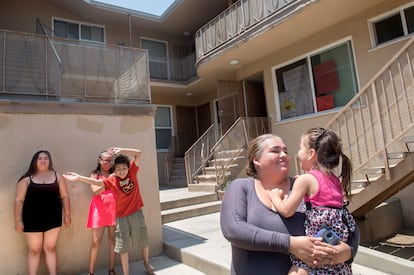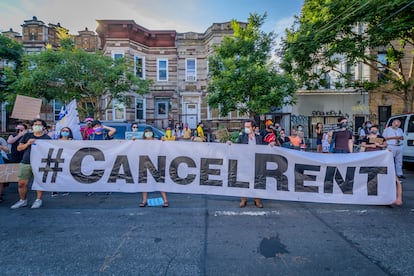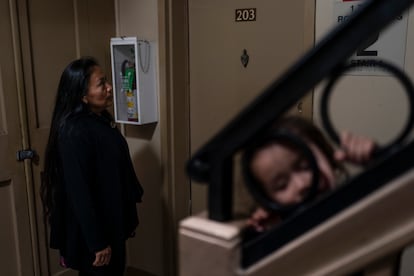More than half of US Latinos worry about being able to pay rent or mortgage each month
Housing prices and inflation are taking a heavy toll on the Hispanic community, in which there is a general concern about not earning enough to make ends meet

An analysis of the financial situation of the U.S. Latino population reveals serious struggles in many of the homes in the fastest-growing community in the country. Just over half (52%) of Latinos are concerned about their ability to meet basic needs like paying next month’s rent or home mortgage. A survey conducted by BSP Research for UnidosUS and Oportun among Latinos in California, Arizona and Texas last April reveals that the reality for most families is far from being financially comfortable.
This is despite the fact that the Latino community, 62 million people in the United States, has multiplied its economic contribution to the national GDP two and a half times in just a decade, reaching $3.2 trillion. Also despite better employment and salary rates and progress in the fight against inflation. The most affected are those who earn less than $29,000 a year: 65% in this low-income group share this concern about paying for housing, but even four out of 10 Latinos who earn more than $50,000 annually view this monthly payment with the same feeling of unease. The concern is most pressing among people aged 25 to 39, younger households, and especially among those without a college degree.

Housing is the largest expense for families, and in recent years both purchase and rental prices have skyrocketed to the point of being primarily responsible for high inflation. There is a lack of affordable housing in many cities where a high proportion of Latinos are concentrated, and the aid that became available during the Covid pandemic has dwindled and disappeared just when it is most expensive to have a roof over one’s head.
But it is not only the market situation that complicates the lives of these families, it is also the lack of sufficient income. Just over a third of the Latino population reveals that their primary concern is to earn more, because what they make is not enough to cover their expenses. Almost half of those who suffer from this lack of income earn less than $29,000 annually, an amount that is double the poverty line for a single person in 2024 but is below it for a household of four people. The lack of sufficient income is also a cause for concern among those with somewhat higher salaries. One in four Latinos who earn more than $50,000 share this concern.

With these premises, it is not surprising that among respondents of the survey, 17% emphasize inflation and daily expenses as one of their concerns. The gradual reduction in price pressure is hardly a relief when inflation skyrocketed very quickly. Santiago Sueiro, senior political analyst at UnidosUS, explains that now that inflation is going down, Latinos are trying to get used to the new prices. “Politicians cannot say that inflation is fine, it must be said that it has gone down, but there is still a lot to do.”
These financial pressures leave little room for savings and even less room for emergencies. These are expenses that always come: it could be a flat tire, a broken window, or having to travel to take care of a loved one. More than a third of Latinos do not have an emergency fund, and 17% have less than $400 in it.
UnidosUS has detected that almost half of Latinos have medical debt and 15% have unpaid bills worth between $500 and $2,500. Medical costs are such a complication for family budgets that one in five do not go to medical appointments, the same proportion does not take their prescribed medication, and 27% avoid going to the dentist.
Sueiro explains that the message of this report is directed not only to the financial sector so that it can adapt to this demographic, but also to politicians because, as they verified in a previous survey in November, the main concern among Latinos, above any other thing, is financial. “The economy and employment are the most important things for Latinos. Whoever wants to have the Latino vote will have to talk about it.” Sueiro adds that although in this community there are more solutions on the Democratic side, the percentage of those who do not see solutions in either party is also growing, up to 20% on some issues.

The analyst says that one of the most positive aspects in recent years is that there have been improvements regarding the management of personal finances by increasing the use of traditional banking. However, the average number of people in this community outside of banking services is higher than the general average, and many Latinos continue to depend on high-cost products with little supervision to cover their costs, such as the so-called payday loans, which involve small amounts of money and high interest rates, as well as check cashing services: 17% use the services of Buy Now, Pay Later, which carries no interest, but 12% also use advances on their credit cards, which are very expensive. And 28% have also needed to borrow from friends and family.
Sign up for our weekly newsletter to get more English-language news coverage from EL PAÍS USA Edition
Tu suscripción se está usando en otro dispositivo
¿Quieres añadir otro usuario a tu suscripción?
Si continúas leyendo en este dispositivo, no se podrá leer en el otro.
FlechaTu suscripción se está usando en otro dispositivo y solo puedes acceder a EL PAÍS desde un dispositivo a la vez.
Si quieres compartir tu cuenta, cambia tu suscripción a la modalidad Premium, así podrás añadir otro usuario. Cada uno accederá con su propia cuenta de email, lo que os permitirá personalizar vuestra experiencia en EL PAÍS.
¿Tienes una suscripción de empresa? Accede aquí para contratar más cuentas.
En el caso de no saber quién está usando tu cuenta, te recomendamos cambiar tu contraseña aquí.
Si decides continuar compartiendo tu cuenta, este mensaje se mostrará en tu dispositivo y en el de la otra persona que está usando tu cuenta de forma indefinida, afectando a tu experiencia de lectura. Puedes consultar aquí los términos y condiciones de la suscripción digital.









































